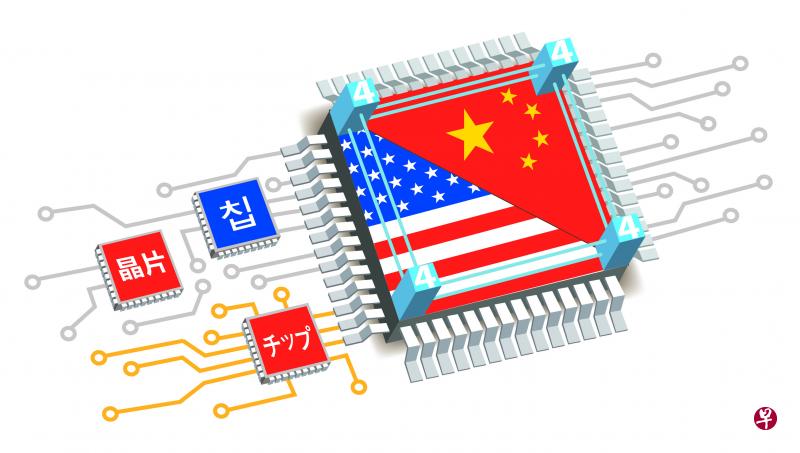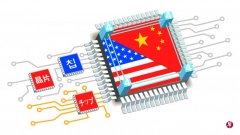
Chinese Special Manuscript
In March of this year, after the United States proposed to South Korea, Japan, and Taiwan, the geopolitical game around the chip problem became the focus of the international focus on chip problems. The first preparatory meeting of the Cabbage Alliance will be held from the end of August to the beginning of September, but as of mid -September, it has not been finalized. Behind the conference that affects China's economic life, what are the geopolitical considerations of the national and regions invited by the chip alliance? What ripples will the competition between China and the United States and the more powerful chip will be on the international stage?
U.S. President Biden officially signed the 2022 chip and technology bill on August 9 this year to make a "historic investment" of $ 280 billion (about S $ 385.7 billion) to the chip industry, indicating that it is necessary to check and balance China and strengthen the United StatesLeadership in the semiconductor field.It is reported in September that the United States is considering restricting domestic enterprises to invest in Chinese technology companies and further tighten the export of artificial intelligence chips to China.
Chinese officials presided over a meeting of the Central Committee for Deepening the Reform of the Central Committee on September 6, emphasizing the need to strengthen the national strategic technology power, greatly enhance the systemic ability of science and technology, "forming competitive advantages in several important areas, winning strategic initiative"Essence
In the past two months, China and the United States have attached great importance to the chip field to upgrade again, marking that the chip competitions of the two countries have gradually entered a new stage;, The chip industry has been pushed to the main battlefield of the Geopolical Political Games in China and the United States step by step.
In March of this year, the United States proposed to Japan, South Korea, and Taiwan to conceptual concepts. In early August, it was reported that the chip Quartet Alliance was about to hold the first preparatory meeting.
Taiwan and South Korea are the world's first and second -largest chips. According to the estimation of market research institutions, Taiwan's market share in the global wafer foundry market has reached 62 %, and South Korea has reached 18 %.Although Japan is not a big producer of chips, it occupies an important position in the production of key manufacturing equipment and photoresal gum materials.The United States has a key electronic design automation technology and has the most semiconductor manufacturing facilities in the world.
The United States, South Korea, Japan, and Taiwan covers all key areas in the chip production chain; if the four places are joined forces, the "card neck" crisis faced by mainland China in the chip field will be significantly warmed.
Semiconductors are affected by the development of science and technology development in China. China takes longer.
Liu Yongyu, an assistant professor at East Asia International Relations at the State University of Singapore, Liu Yongyu, was analyzed during an interview with Lianhe Zaobao. Chip is the basis for the development of all scientific and technological development.It will also impact China's economic and military development.
Liu Yongyu said that China -related intermediary companies and factories related to chips are likely to be difficult to maintain normal trade with foreign companies in the future, which will combat the social and economic stability of the mainland.At this stage, this is just one of the ways to put pressure on China to China. Beijing must find the response method as soon as possible, but it seems that there are no effective solutions.
Since last year, the Bayeng government has gathered the strategy of China to regulate China in diplomacy by gathered the power of democratic countries; some opinions believe that if the Bayeng government can reduce Taiwan, South Korea, and Japan through the chip Quartet Alliance to the economy of mainland China to ChinaDependence, diplomacy will help increase the influence of the United States to East Asian allies.
Liu Yongyu pointed out that the main goal of the Four -Party Alliance of the Chip is to limit the rise of Chinese science and technology. At the same time, the invitation parties belong to the democratic region. This provides a foundation for support and continuity for the US strategy.The planning of the Democratic Alliance complements each other.
China has paid attention to the self -sufficient ability of core basic components and key basic materials as early as 2015, and in the first 10 -year program of the "manufacturing power" strategy, in China Made in China 2025, listing the core basic components and components and componentsThe key basic materials autonomous guarantee rates reached 40 % and 70 % of the targets in 2020 and 2025, respectively.
But market research and adjustment company IC Insights data shows that only about 16 % of China's semiconductors in 2020 are purchased from domestic procurement.
Bert Hofman, director of the East Asia Research Institute of Singapore, predicts that the semiconductor field in mainland China will take a longer time to catch up with other regions. At present, the investment in advanced semiconductors in mainland China is not too successful.One of the reasons is that the measures for the development of semiconductors in the mainland are relatively scattered, and many local governments chase the same goals.Because local officials' performance system rewards short -term political achievements, many local governments have a shorter vision to develop the semiconductor industry.
China's huge market in China is difficult to give up
Although the chip Quartet alliance seems to be aggressive, whether the United States can achieve a huge question mark in the concept of the Cisaisin Alliance.
China is currently the world's largest semiconductor market. It is generally believed that whether the United States can persuade Taiwan and South Korea to abandon the huge mainland market and absorb the huge chip exports of the two places.The key to implementation.
Taiwan, South Korea, and Japan are also likely to worry about the economic retaliation of mainland China, and refuse to cooperate with the United States to implement scientific and technological enclosures on the mainland.
A report from the Global Semiconductor Industry Association of the Market Investigation Agency shows that the sales of chip in the Chinese market reached 192.5 billion US dollars, accounting for 34%of global sales.According to statistics from data analysis agencies, nearly 60 % of integrated circuits in Taiwan in 2021 were exported to the mainland and Hong Kong.South Korea's semiconductor exports to mainland and Hong Kong also account for about 60 % of the total export volume.
For more than two months of American politics, it has been actively visited by the Two -Party Alliance. It has been invited to the area. In August, Taiwan has ushered in six groups of American politics delegations, including the US House of Representatives Perlis, Perosi.
After visiting Japan and South Korea in July in July, US Secretary of Finance, US Vice President Harris also announced that he visited Japan and South Korea at the end of September; Bynden first visited South Korea as a US president in May, the first stop was to visit SamsungSemiconductor factory located in Pyeongze.
But the establishment of the Fascus Alliance of the Chip is extremely slow. Taiwan stated in Taiwan in mid -August that the preparatory meeting was not received. Although South Korea has determined to attend the meeting, many Korean media quoted South Korean government officials last month that South Korea has proposed to participate in participationThe conditions of the meeting, including the meeting, cannot stimulate China, and the meeting is not to form an alliance, but to strengthen cross -border chip cooperation.
South Korea and Japan's cautious attitude towards Taiwan's cross -border cooperation mechanism, and the long -term tension between Japan and South Korea have been regarded by the outside world.One of the challenges of the chip Quartet Alliance conception.
The dispute over the semiconductor ignited in Japan and South Korea in 2019 is still unreasonable.Japan announced that it was restricted to the important semiconductor and organic light -emitting diode panel raw materials for exporting to South Korea at the time. This restriction has not yet been lifted.
Some analysts believe that the preparatory meeting of the Fourth Union of the Chip has not yet been finalized, indicating that the United States is difficult to reach consensus with Taiwan, South Korea, and Japan.
Sourabh Gupta, a senior researcher at the China -US Research Center in Washington Think Tank, interpreted, the idea of the Two -Party Alliance was mixed for South Korea and Taiwan.South Korean semiconductor companies rely on the Chinese market to advance their income and profits, and these income and then return to the research and development of semiconductors in South Korea.However, as Chinese manufacturers have gradually squeezed into the market originally occupied by Samsung and SK Hynix, the rich profits brought by the Chinese market will become the past.
For Taiwan, the chip Quartet alliance and the US 2022 chip and the technology bill cannot be separated from the relationship. The purpose of the chip bill is to reduce the "Chinese risk" faced by the United States, including relying on Taiwan's production and exports.EssenceThe overall logic formed by the Fourth Union of the Chip includes the chip production capacity of the Taiwan islands to a certain extent; correspondingly, the revenue and profits of Taiwanese chip manufacturers will also decrease.
Southeast Asian countries mainly occupy the downstream of the chip production chain, and it is expected that it will not be affected by the battle between China and the United States.With the increase in the chip industry in China and the United States, Southeast Asian countries may get more opportunities in chip assembly, packaging and testing.
-Gu Pita, a senior researcher at the China -US Research Center in Washington Think Tank
Scholars: chip price or decline in other countries will benefit
Scholars of interviewed scholars predict that the establishment of the Tabs Alliance will not bring a direct impact on Southeast Asia and Europe, and may even reduce global chip prices and benefit the chip Quartet Alliance and other regions outside China.
Analysis generally believes that the United States' siege measures for Chinese chip imports will promote China to accelerate its own chip development.Statistics from the International Semiconductor Industry Association show that the construction plant in mainland China ranks first in the world. It is estimated that by the end of 2024, 31 large wafer factories will be built, which mainly locks the mature process;During the period, it is scheduled to be put into operation 19, and 12 in the United States.
Matual chip is down or excess
Many analysts believe that with China's investment in the chip field, the mature -making chip may be excessive.
The senior researcher of the China -US Research Center in Washington Think Tank analyzed that the main goal of the Sic -Party Alliance of the Chip is to limit the flow of advanced process semiconductor technology into China. Except for the two countries that involve high -end semiconductor supply chains in the Netherlands and Singapore,It will not directly feel the impact of the chip Quartet Alliance.
On the contrary, if China and the United States invested a large amount of allowance to the semiconductor industry in a short time, leading to excessive semiconductor output, Europe and Asia's fine security may benefit from the decline in chip prices.
Liu Yongyu, an assistant professor at East Asia International Relations at the National University of Public Policy, Singapore, pointed out that Southeast Asian countries mainly occupy the downstream of the chip production chain, and it is expected that it will not be affected by the dispute between China -US chips.
With the increase in the chip industry between China and the United States, Southeast Asian countries may get more opportunities in chip assembly, packaging and testing.
Economy depends on China and South Korea.
On the one hand, it is the largest trading partner, and on the other hand, the important allies and military alliances -chip square alliances make South Korea fall into a dilemma.factor.
South Korea ’s President Yin Xiyue took office in May this year, clearly moved closer to the United States, causing China -South Korean relations to cool down rapidly.South Korea proposed to officially join the Indo -Pacific Economic framework in May; it is reported that South Korea will accelerate the recovery of the Sade base in normal operation; the United States, Japan, and South Korea have held the first ballistic missile defense exercise in five years in August.
However, even in the context of cold China and South Korea's diplomatic relations, the economic and trade connections between the two countries continue to grow.From January to July this year, South Korea's actual investment in China increased significantly by 44.5%, ranking first in China ’s investment growth rate.
China has ranked the largest trading partner country in South Korea for 18 consecutive years. World Bank data shows that South Korea ’s imports and exports to China accounted for more than 20 % of South Korea’ s import and export.Times.
South Korea's economic dependence on China has become the biggest constraint that Yin Xiyue's government moves closer to the United States.When South Korea will participate in the preparatory meeting of the Cabbage Alliance, it will cause concerns of the Korean chaebol. Many Korean public opinion warns warnings on the negative impact of the chip Quartet alliance.
Samsung CEO Qing Guixian, who is responsible for the chip business, publicly stated in early September that Samsung was trying to seek a win -win solution and it was difficult to abandon the Chinese market.In February this year, Samsung also announced that the former US ambassador to South Korea, Mark Lippert, is in charge of North America's affairs, showing that the Korean chaebol has prepared to deal with the increasingly fierce geopolitics and diplomatic games in the chip field.
The South China Morning Post quoted Zhu Zaiyou, a professor of Chinese foreign policy at Qingxi University in South Korea, saying that except South Korea, no other countries and regions will take into account China's interests in the chip Quartet Alliance.At present, China and the United States need South Korea. If South Korea can play this role, it may be a win -win situation. South Korea can increase negotiation chips with Beijing.
Scholars: South Korea is the chip Quartet Alliance "variable"
Gutta, a senior researcher at the China -US Research Center in Washington Think Tank, pointed out that South Korea will be a "swinging variable" in the chip Quartet Alliance.Taiwan does not have much dominance in relations with the United States. Japan plays a small role in the overall semiconductor industry; in comparison, South Korea occupies a more important position in the semiconductor field.Business model.
Gubuta said that Beijing understands this, so it is expected to treat South Korea more respectfully.
But Liu Yongyu, an assistant professor at East Asia International Relations at the State University of Singapore, said that although South Korea has a global influence in the chip field, it does not dominate the market. Therefore, it is difficult for South Korea to meet the source between the two major powers.South Korea is an important ally in the United States. It is not reasonable to serve as a balance between China and the United States.



